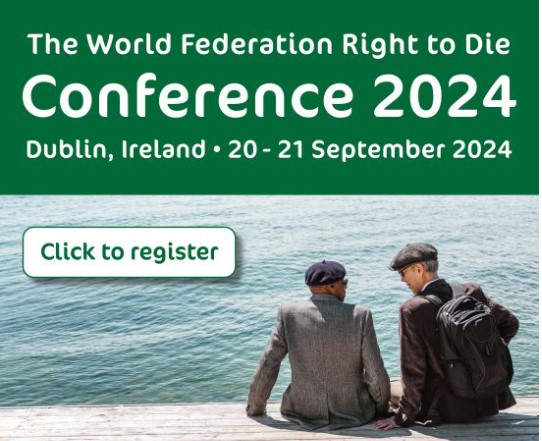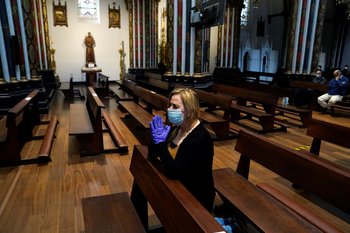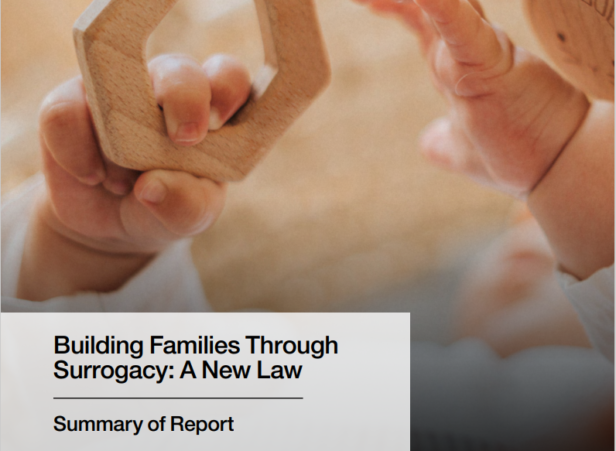Candelabri di stelle
sulla piazza remota
come un' immensa basilica vuota
La croce enorme col Cristo
(unico segno di veglia)
sorveglia
la fontana di Papa Sisto.
Le quattro strade assorte
camminano fin sulle porte
della città sgominata.
Assediata?
Messa a fuoco?
Abbandonata?
Il gobbo - unico cittadino
reperibile
fece dalla soglia capolino
e si avanzò - stampellando
sulle gambe contorte
di contrabbando.
Corsero brividi d'orrore
su tutte le porte ...
bendate
dalle gelide mani della sera ...
Il gobbo raggiunse la croce
nel centro della piazza
e a colpi di zappa la svelse
dalla terra scavata di recente.
Poi se la caricò sulle spalle
con tutto il suo Cristo
sanguinolento
si segnò con l'acqua di Papa Sisto
e disparve
fra i capelli discinti dell'ultima luna.
All'alba gli abitanti
della cittadella risorta
morirono d'orrore sugli sbocchi
della minuscola piazza.
Dalla croce pendeva
incoronato di spine
il piccolo gobbo mago
con un sogghigno di lago
sulle labbra paonazze.
da Baionette (1915)
botblog (probabilmente il più vecchio blog italiano ancora attivo)
giovedì, ottobre 17, 2024
Il furto
giovedì, settembre 26, 2024
Extreme euthanasia agenda revealed at Irish conference

Last month, End of Life Ireland hosted the 2024 international conference of the World Federation of Right to Die Societies, which pro-euthanasia campaigners from around the world attended. Several speakers at the conference made no secret of their wish to see euthanasia and assisted suicide permitted on very broad grounds indeed, far beyond the terminally ill. They are not even trying to hide the slippery slope.
On 17th October, the Dáil will vote on the Report of the Joint Oireachtas Committee on Assisted Dying, which recommends both euthanasia and assisted suicide for patients with an incurable and irreversible condition. We can already see the ambition of campaigners to go much further than this.
Speakers at the conference included Justin McKenna and Jane Lazer of End of Life Ireland. When they appeared before the Oireachtas Committee, they expressed a wish that euthanasia and assisted suicide be made available on broad grounds. They clearly stated their aim to extend assisted suicide to include patients suffering from conditions such as dementia and multiple sclerosis. Some of what they had to say can be found here.
Another speaker was Colin Brewer. He is worth noting because he was struck off the medical register in Britain in 2006 for serious professional misconduct. According to The Guardian, he had provided “patients with a lethal cocktail of drugs that led to the death of one and the development of further addictions in several others”.
Later, Brewer revealed that between 2013 and 2016 he had helped six British patients with dementia to end their lives at assisted suicide clinics in Switzerland, despite none of these patients being terminally ill. Although Brewer was no longer licensed to practise in Britain, he nonetheless assessed these patients’ mental capacity to choose death before their trips abroad.
Why did the Irish speakers seem happy to share a platform with him?
Brewer is an advocate for euthanasia not only for those suffering from dementia but also for “patients with motor neurone disease, stroke and other intractable and/or progressive conditions don’t want to face years of intolerable quality of life.”
At the Dublin conference, Brewer’s presentation was titled: “Most people considering MAID (medically assisted death) for early dementia aren’t ‘depressed’, they are understandably unhappy.” His panel also featured a presentation titled “Dementia as part of the end of life conversation,” and on the same day, two Canadian activists spoke about “Glimpses into dementia and assisted dying”.
Five of the six patients assessed by Brewer ended their lives at the Dignitas clinic in Zurich.
Silvan Luley, a representative of Dignitas, also spoke at the conference. His talk, “Assistance for the right to choose the time and manner of one’s end of life – Beyond terminal”, underscored that Dignitas offers assisted suicide not only for terminally ill patients but also for those with “unbearable pain”, which is defined entirely at the discretion of the person seeking to die.
When Luley presented at the Joint Oireachtas Committee, last year, he noted that less than half of those who die at Dignitas are terminally ill.
Luley also revealed that 12 Irish residents have died at Dignitas since 2003, while approximately 100 Irish people are currently members of the organisation. The membership fee for “accompanied suicide” is 2,500 Swiss Francs (around 2,600 euro), but the full service, including funeral and administrative arrangements, costs more than 11,500 euro plus VAT.
During his address to the Joint Oireachtas Committee, Luley emphasised Dignitas’ philosophy: “The core thing really is to install a system of maximum freedom of choice and at the same time education for the public and education for the healthcare system and healthcare professionals so they learn how to deal with and how to listen to wishes of people who say "I do not want to continue living". We must change the culture via education in the direction of making the base layer so that people can come forward and whatever the reason may be for them to say "I want to end my own life, I want to die and I want to use suicide", they are being met at eye level and from there on, there is discussion around what is there in terms of solutions towards reinstalling quality of life, to bring them back on track to enjoy life and have a good quality of life, and if that is not possible to make it possible that these people can have a professional way out of their suffering, which is assisted dying.” TDs who will vote on the above-mentioned Report next month should make themselves aware of what was said at last week’s conference and recognise that once assisted suicide or euthanasia are legalised, the pressure will be on to expand the grounds far beyond the terminally ill.
Members of the Dáil who will vote on the Report next month must recognise that once assisted suicide or euthanasia is legalised, it becomes difficult to maintain strict limitations. The experiences of other countries, along with discussions at the recent international conference, demonstrate that there will be continual pressure to further liberalise these laws. To prevent such escalation, the Report must be firmly rejected.
P. S.
A prominent pro-euthanasia campaigner in Ireland is Tom Curran from Exit International. Exit International was previously a member of the World Federation of Right to Die Societies but left in 2021. While the Federation prefers a medical model regulated by legislation, Exit International believes euthanasia and assisted suicide are fundamental human rights. They argue that any mentally competent adult should have access to these options without needing to meet any medical criteria, and that healthcare professionals should not be required to participate.
martedì, settembre 17, 2024
The controversial content of an SPHE textbook for young teenagers
Last week, a publisher issued an apology for the stereotypical portrayal of an Irish family in a textbook. The volume, which was withdrawn following public outrage, was produced for the new Junior Cycle course on Social, Personal, and Health Education (SPHE) introduced last year by the Department of Education.
A
closer examination of these SPHE textbooks reveals even more serious
concerns. One such example is “My Wellbeing Journey”, a text from a
major publisher, authored by prominent SPHE teachers.
One
of the authors is Eoghan Cleary, Assistant Principal at Templecarrig
Secondary School, Co. Wicklow, who is often invited to comment on sex
education on radio and television.
The
second volume of “My Wellbeing Journey”, aimed at students aged 13–14,
includes a lesson dedicated entirely to masturbation. In one of the
exercises, labelled a "pairs activity", students are presented with
images of eleven animals and asked to guess, together with their
classmates, how many of these animals engage in masturbation. This
activity is undeniably shocking, yet the book is freely available online
for anyone to verify: https://online.flippingbook.com/view/814709122/128/#zoom=true
Is animal behaviour really a good guide to human behaviour? Humans have reason and a moral sense. Animals do not.
Young
students are also told that “Even babies and young children know it
feels good to touch their own genitals.” This appears to be presenting
babies and toddlers as sexual beings.
Another author of “My Wellbeing Journey” is Pam O’Leary, an SPHE teacher at Cork Educate Together secondary school.
In
an interview about sex education some years back, Pam O’Leary stated:
“I’m interested in teaching students about safety and health. Morality
shouldn’t come into Relationship and Sex Education. It’s not about what
students should do in any moral sense”. Would most parents agree with
this view?
Accordingly, the “My Wellbeing Journey” textbook makes no direct reference to moral values, focusing instead on the concepts of ‘healthy boundaries’ and ‘safe spaces’. It suggests that choices and behaviours are acceptable as long as they are deemed "healthy and safe". However, it is impossible to teach human relationships and sexuality without referencing ethical principles. Human beings inherently base their decisions on values and principles.
Even more perplexing is the attempt to use animal behaviour as evidence that certain actions are normal or natural. Animals are driven by biological imperatives and instinct, whereas humans are free to act according to what they believe is right and just. Forced copulation or aggressive mating, for example, is not uncommon in the animal kingdom but the authors, obviously, do not mention this in their chapter about consent because we are more than animals, we are moral beings. So why do they cover masturbation among animals in a textbook for young teenagers?
The textbook also makes no mention of marriage, which is perhaps unsurprising given that the National Council for Curriculum and Assessment, with the blessing of the Department of Education, removed references to marriage and parenting from the SPHE curriculum.
Textbooks
and teachers are granted a certain degree of flexibility in covering
topics outlined in the NCCA curriculum, nonetheless, there is no
promotion of commitment or long-term relationships. These concepts are
never presented as preferable to casual or short-term relationships.
Instead, the message remains: it is all acceptable if it is "healthy and
safe". Again, what do parents think?
Unsurprisingly,
the curriculum includes lessons on "gender identity", which is
presented as fact rather than as a contested ideology that separates
being male or female from biological reality. The volume is so steeped
in gender ideology that some of the expressions used sound ridiculous.
For
example, in the section on puberty in Volume 3, the authors say: “Most
typically, people with female-typical anatomy generally begin puberty at
11 years of age, and those with male-typical anatomy begin at 12 years
of age”.
Girls are thus referred to as “people with female-typical anatomy”, and boys, of course, as “those with male-typical anatomy”. These convoluted expressions are used in the name of ‘inclusivity’, as, according to gender ideology, not all individuals with female-typical anatomy are women.
They are whatever ‘gender’ they identify as and remember, nobody knows how many genders exist.
Many
parents likely disagree with this gender ideology. Are they aware that
it is now the dominant philosophy framework taught in SPHE classes?
Are they aware of what else is in these SPHE textbooks, and also the key aspects of life that are missing?
venerdì, settembre 13, 2024
Città di vita
Negli ultimi anni della sua esistenza Auro D'Alba scrisse per la rivista bimestrale "Città di Vita", pubblicata dalla Basilica di Santa Croce in Firenze.
Ho aggiunto i dettagli di questi articoli di Auro D'Alba alla pagina dedicata alla sua bibliografia.
mercoledì, settembre 04, 2024
martedì, settembre 03, 2024
Strade dei villini
Pel dolce sole, per le bianche stelle
si piacque la dolente anima mia
ritornare a l'ignota nostalgia,
sorella triste fra le tue sorelle;
ed ascoltò la semplice elegia
d'una volta, fra i chiostri di mortelle
vide ancora sorridere a le celle
di Sant'Agnese l'umil litania:
Ma l'ospedale mi cantò nel cuore
il miserere delle sue corsie,
eco dei gravi passi della morte,
e risvegliate dall'antico orrore.
l'ombre imminenti per le bianche vie'
dischiusero i battenti delle porte'
giovedì, agosto 29, 2024
The newspaper that stood up for freedom of worship during the pandemic

During the Covid-19 pandemic, the Irish Government imposed the longest ban on public worship in Europe, while in Northern Ireland restrictions were less drastic. A new academic study says that religious institutions and media outlets largely supported these measures, with the main exception of the Irish Catholic newspaper.
The study, by Gladys Ganiel and Caoimhe Ní Dhónaill from Queen’s University Belfast, analyses the response from the main Churches, and also religious publication to the very restrictive approach by the authorities.
The two authors noticed that “strict restrictions in other countries prompted religious leaders to criticise the government or to seek redress in the courts on grounds of religious freedom. But such discourses were almost absent on the island of Ireland.”
Religious institutions, including the Catholic Church and Protestant denominations, largely supported the government-imposed restrictions, despite their often very heavy-handed nature. The churches justified their stance by appealing to the broader common good and the need to protect the most vulnerable members of society from the virus.
“No churches, church leaders, or church groups brought religious freedom cases to the courts”, (unlike in various other countries) observed the study. The only exception was Declan Ganley, a prominent Catholic businessman, who contended that the government’s ban on public worship was unjust and violated the fundamental rights of believers. The case was ultimately dropped when restrictions were eased.
Ganiel and Ní Dhónaill noticed that in Northern Ireland, religious leaders were more actively consulted by the government than in the South. This consultation led to a generally cooperative stance by religious institutions in the region. The Protestant churches, for example, continued to encourage adherence to the restrictions while also acknowledging the emotional and psychological toll the pandemic was taking on individuals, particularly due to isolation and the inability to gather for worship.
In the Republic, however, “the government’s approach to restrictions revealed a lack of trust in religion: piety could be perceived as dangerous; or, alternatively, the rights of the pious were deemed less important than those of others”, says the study.
While the Catholic hierarchy accepted the State’s top-down approach and officially supported the government’s measures, there was a notable voice of dissent within the religious media. The Irish Catholic newspaper emerged as a critic of the measures, particularly concerning the ongoing closure of churches.
The paper voiced frustrations over the exclusion of religious services from essential activities, contrasting Ireland’s severe restrictions with more lenient approaches in other European countries.
Quite a few of the articles in that newspaper which questioned the ban on public worship were written by the head of the Iona Institute, David Quinn.
Initially supportive of the government’s efforts, the Irish Catholic‘s tone shifted as the pandemic progressed. The paper highlighted the prolonged closure of churches even as other parts of society began to reopen, questioning why religious gatherings were considered less essential than other activities. This position reflected a broader concern within the publication that Ireland’s secularising public sphere was increasingly marginalising religious expression.
Even the Catholic Church leadership was criticised for not doing enough to defend the rights of the faithful. The paper argued that the government’s approach represented a form of modern-day persecution, likening it to historical anti-Catholic measures.
In contrast, the Protestant media in Northern Ireland, where there was more dialogue between church leaders and the government, largely supported the restrictions and praised political leaders for their decisions.
sabato, agosto 24, 2024
John Henry Newman: Education, Wisdom and the Gentleman
venerdì, agosto 23, 2024
New poll shows public misgivings about euthanasia

A new poll highlights significant public concerns about the potential legalisation of euthanasia and assisted suicide in the UK. It also highlights contradictory attitudes. There is broad support for allowing the procedures but nervousness about how it may work out.
While a majority may support “assisted dying” in principle, many feel that the complexities and risks involved make it unsafe for implementation in Britain. A substantial 60pc worry that pro-euthanasia legalisation would alter the doctor-patient relationship, and 56pc fear it could normalise suicide.
Concerns also include the possibility of pressuring vulnerable people, especially under the strain of NHS budgets, to choose death. 43pc fear it could incentivise health professionals to encourage some patients to take their lives.
The poll found that most people supported legalising euthanasia or assisted suicide but believed it would backfire in practice. (Curiously, the poll found that the 18-24 age cohort is the only in which the majority of respondents does not support a change in the legislation.)
Moreover, 70pc of respondents believe that countries like Canada and the Netherlands have “gone too far” with similar laws.
In both of these countries some of the worst fears of euthanasia critics have been confirmed (see here and here) and these fears are confirmed by a new report about Canada titled “From exceptional to routine”.
This study shows that “Medical Assistance in Dying” (MAiD) was introduced in 2015 as a rare option and it is now the fifth cause of death in Canada.
While the number of denied requests continue to decrease every year, approved cases went from 1,028 in 2016, the first year of operation, to 13,241 in 2022. This represents a thirteenfold increase. No other country has seen such a dramatic rate of growth.
Unlike other jurisdictions, the criminal prohibition in Canada on euthanasia and assisted suicide was overturned not through new legislation but through the courts. It was originally intended for exceptional cases and then, in a few years, most of the initial safeguards have been removed by judges or by legislators.
For instance, there was a minimum ten-day assessment period for MAiD but a government bill removed it in 2021. The median time between written request and death in 2022 was only eleven days, and it is possible for requests to be assessed and provided in a single day.
Moreover, the previous requirement that the patient give final consent before administration of death is now no longer mandatory.
Euthanasia and assisted suicide became initially available to persons whose death was “reasonably foreseeable” and later it was extended to anyone considering that their physical suffering, from a disability for example, is intolerable to them.
One of the few restrictions still in place is again under attack. Currently, people suffering solely from mental disorders are not eligible for MAiD but a very recent case aims at removing this safeguard as it is considered discriminatory.
If it is offered to those who are in physical pain, why not to those who are in mental pain, argue the pro-euthanasia campaigners.
The growing acceptance and expansion of euthanasia and assisted suicide in Canada, including the potential for its use solely in cases of mental illness, raises alarms about the inevitable slippery slope such legalisation would create. Something worth considering before any attempt to change the law, here or in the UK.
giovedì, agosto 15, 2024
Unlike Ireland, Britain can see the problem with international surrogacy

Ireland has recently passed one of the most permissive surrogacy law in Europe. To appreciate how extreme this law is, it can be compared with what is in the report issued last year by the Law Commission of England and Wales, in collaboration with the Scottish Law Commission.
This report reviews the current legislation and case law in the UK, which is already liberal by international standards, and proposes recommendations, including a draft bill for potential implementation. Unlike us, it recommends against international surrogacy.
Currently, in the UK, surrogacy is permitted, but the commissioning parents can apply for a parental order only after the child is born. The report recommends a new pathway so that the commissioning parents do not need to make an application to the court but, instead, their pre-conception agreement with the surrogate mother is registered by a newly proposed regulatory body, and they become legal parents as soon as the child is born.
The report repeatedly specifies that the pre-conception agreement is not a contract and is not enforceable by the parties against each other as a matter of contract law. The gestational mother can withdraw her consent before birth and up to six weeks after the baby is born.
In Ireland, the regulatory authority approves the surrogacy agreement before birth, and the application for a parental order is made after birth. This is the case for domestic and international arrangements.
The UK law reform, however, recommended against including international surrogacy arrangements in their proposed pathway, using the same arguments presented in Ireland—unfortunately without success—by the few members of the Oireachtas who opposed the new legislation.
“We have concluded that international surrogacy arrangements should be excluded from the new pathway, as we are concerned by the risks of exploitation since international surrogacy is beyond the jurisdiction of surrogacy regulation in the UK. … Such international surrogacy arrangements are almost invariably commercial in nature,” the report says.
The report highlights ethical, legal, and practical challenges. It acknowledges that international surrogacy often occurs in countries with weaker regulations, increasing the risk of exploitation of surrogate mothers. These women may face inadequate legal protections, poor healthcare, and financial arrangements that are not transparent or fair. The disparities in legal standards between countries can also create significant legal uncertainties for intended parents, particularly when bringing the child back to the UK.
“The risks of exploitation will depend on the effectiveness of regulation provided by national laws in different countries, and the impact that the payment available to women to be a surrogate can have on the lives of the surrogate and her family. Concerns may be greatest where regulation is inadequate, the sums of money payable to women who act as surrogates are life-changing, and where women do not have equal access to employment, education or other opportunities. While we do not consider that all international arrangements will necessarily be exploitative, we consider that the risk of exploitation is considerably higher than in domestic agreements and that those risks cannot be controlled by domestic laws”, says the report.
The UK Law reform document also notes the potential risks to the welfare of the child, including issues related to legal parentage, citizenship, and the child’s right to know their origins. The lack of international agreements on surrogacy standards exacerbates these risks, leading to inconsistent practices and outcomes.
Similar concerns were raised at the hearings of the Special Oireachtas Committee, even by some state officials, but they have been completely ignored by the Government. It is not an exaggeration to say that Ireland new surrogacy legislation is extreme, with no concern for the exploitation, commodification, and psychological harm caused, here and abroad.